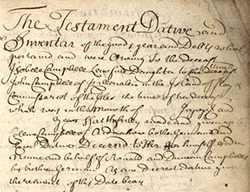
3. Introduction To Testaments Dative - Vocabulary
When thinking about the word 'testament' in this sense, most people imagine a testator, someone who makes a will, naming executors one or more persons to carry out the terms of the will. In Scotland this form of testament was called a testament testamentar.
There is no legal requirement for individuals to make wills and the vast majority of people die intestate, that is without making a will. If someone dies intestate, there is no obligation for the successors to go to court and many families sort things out amicably amongst themselves. In such cases no testament is recorded.
Sometimes the successors feel the need to appoint an executor to make the necessary legal and financial arrangements relating to the estate on their behalf. The process by which an executor is appointed by a court, in the absence of a will, results in a document called a testament dative.
In the eighteenth century heritable property (land and buildings) could not be bequeathed in a will: on the death of the owner it passed to the heir (usually the eldest son). Movable property (cash, livestock, furniture, clothing etc) was used to meet any outstanding debts owed by the deceased, and the remainder was divided into a maximum of three parts: the widow's part, the bairns' part (all children had a right to an equal share) and the dead's part. The dead's part could be bequeathed in a will, but in testaments dative there was no will, so the division was between the widow and the children (and where one or other of these did not survive, there was no division).
Until 1823 the appropriate court was usually a commissary court, whose jurisdiction was based on the diocese of a pre-Reformation bishop. The court levied a fee for confirming the testament: this was called the quot and was usually one-twentieth of the value of the movable property of the deceased which remained after any debts had been paid.
If the value of the movable estate was very small, the court might waive the quot. In the margin of a testamentary register this may be indicated by the words quota nulla or na quot (literally no quote). By the mid-eighteenth century families and creditors used the testamentary process to pursue relatively small amounts of money (such as salary owed to the deceased or a specific debt owed by or to the deceased).
Commissary courts recorded the testaments in registers and the majority of testaments in seventeenth and eighteenth century registers are testaments dative. Most appoint family members as executors and these are called testaments dative qua nearest in kin. If the deceased died in debt a creditor could have himself appointed executor. In such cases, the testament is called a testament dative qua creditor.
Glossary
| Term | Definition |
|---|---|
| Testator | Someone who makes a will/testament |
| Executor | Someone who is appointed to carry out the terms of the will/testament |
| Testament testamentar | A testament in which an executor is named |
| Intestate | Where someone has died without making a will/testament |
| Testament dative | A testament in which an executor is appointed by the court |
| Heritable property | Land and buildings |
| Moveable property | Cash, livestock, furniture, clothing etc |
| Widow's part | A third of the value of the deceased's estate which would be left to the widow, also called jus relictae |
| Bairn's part | A third of the value of the deceased's estate which was left to their children and divided equally among them, also called legitim |
| Dead's part | A third of the value of the deceased's estate which was disposed of in accordance with the wishes expressed by the decieased in their will also called the deid's part |
| Quot | The fee levied by the court for confirming the testament usually one-twentieth of the value of the moveable property after debts had been deducted |
| Quota nulla a quot | Annotation in a testament to show that the court had waived the payment of the quot (see above) |
| Testament dative qua nearest of kin | A testament in which the executor or executors appointed are members of the deceased's family |
| Testament dative qua creditor | A testament in which the testator died in debt and the creditor or creditors have themselves appointed as executor. |